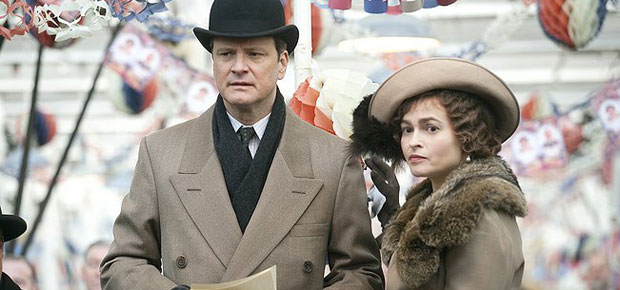
What it's about:
When his brother abdicates, "Bertie" unexpectedly ascends to the throne of England just as the prospect of a second world war grows with each day. But the future King George VI has to contend with a debilitating speech impediment, which an unconventional Australian speech therapist agrees to treat.
What we thought:
It's tough to judge historical dramas on their factual representation – frankly, none of us were there. So we only really have the film as an artefact upon which to try to dissect the film's craft, the emotional authenticity of the performances, and, perhaps, the interpretation of the story.
The King's Speech is widely considered among the favourites for a number of this year's Oscars, and in the case of Best Actor there's a case to be made. Colin Firth is excellent as "Bertie", conveying a thoroughly uncomfortable and probably embarrassed second son of a king - a contradiction in social emotions.
It is also fair to say Rush (as therapist Lionel Logue) and Firth play across each other superbly. Their relationship is a key motivator of the story, and it is equally powerful when injected both with humour and conflict. Both their fights and their humourous back-and-forths are compelling viewing, and often mask each other convincingly.
On another note, Nettie Chapman's glorious art direction may as well be a character in the movie, so central to the feel of the film it is. England between the wars always seems quite a difficult period to capture on film, but the sets and settings are so captivating that cinematographer Danny Cohen (another nominee) enjoys framing several shots with walls and furniture as focal points.
But whether or not all the above qualifies The King's Speech as the Best Film of the Oscar year is debatable. The film hits all the rights marks when it comes to what traditionally does well at Oscar time (historical, foreign cast, and erm... historical!) , but something about it – much like royalty – remains cold and distant.
This is in unexpected contrast with Stephen Frears' The Queen (2006), in which Elizabeth is portrayed at first as a similarly vulnerable, trapped, but out-of-reach monarch. But Frears eventually delivers a much stronger emotional turning point to the film. Remember the scene outside the palace gate, where the queen turns to face the crowd of mourners, seemingly unsure what to do?
The scene that should serve the same purpose in The King's Speech doesn't convey the same empathy, because like the good doctor, we are never really allowed to be on the same level as Bertie emotionally or otherwise. He is the King, and as he tells Lionel Logue early on: "I'm not... -here to discuss... -p-p-personal matters."
Looking elsewhere, the often likeable Guy Pierce is awfully miscast as Edward VII, and we don't get to spend enough time with a scene-stealing Michael Gambon as Bertie's dominating father.
And it may be harsh to point out, but Bonham-Carter's nomination is also a little less convincing, not because she plays the part of Queen Elizabeth I poorly, but her role is played for the light relief. She seems to be the only Royal with a sense of humour about her station, which in a film like this, is memorable, but not necessarily award-worthy – a bit like the film as a whole, actually.
When his brother abdicates, "Bertie" unexpectedly ascends to the throne of England just as the prospect of a second world war grows with each day. But the future King George VI has to contend with a debilitating speech impediment, which an unconventional Australian speech therapist agrees to treat.
What we thought:
It's tough to judge historical dramas on their factual representation – frankly, none of us were there. So we only really have the film as an artefact upon which to try to dissect the film's craft, the emotional authenticity of the performances, and, perhaps, the interpretation of the story.
The King's Speech is widely considered among the favourites for a number of this year's Oscars, and in the case of Best Actor there's a case to be made. Colin Firth is excellent as "Bertie", conveying a thoroughly uncomfortable and probably embarrassed second son of a king - a contradiction in social emotions.
It is also fair to say Rush (as therapist Lionel Logue) and Firth play across each other superbly. Their relationship is a key motivator of the story, and it is equally powerful when injected both with humour and conflict. Both their fights and their humourous back-and-forths are compelling viewing, and often mask each other convincingly.
On another note, Nettie Chapman's glorious art direction may as well be a character in the movie, so central to the feel of the film it is. England between the wars always seems quite a difficult period to capture on film, but the sets and settings are so captivating that cinematographer Danny Cohen (another nominee) enjoys framing several shots with walls and furniture as focal points.
But whether or not all the above qualifies The King's Speech as the Best Film of the Oscar year is debatable. The film hits all the rights marks when it comes to what traditionally does well at Oscar time (historical, foreign cast, and erm... historical!) , but something about it – much like royalty – remains cold and distant.
This is in unexpected contrast with Stephen Frears' The Queen (2006), in which Elizabeth is portrayed at first as a similarly vulnerable, trapped, but out-of-reach monarch. But Frears eventually delivers a much stronger emotional turning point to the film. Remember the scene outside the palace gate, where the queen turns to face the crowd of mourners, seemingly unsure what to do?
The scene that should serve the same purpose in The King's Speech doesn't convey the same empathy, because like the good doctor, we are never really allowed to be on the same level as Bertie emotionally or otherwise. He is the King, and as he tells Lionel Logue early on: "I'm not... -here to discuss... -p-p-personal matters."
Looking elsewhere, the often likeable Guy Pierce is awfully miscast as Edward VII, and we don't get to spend enough time with a scene-stealing Michael Gambon as Bertie's dominating father.
And it may be harsh to point out, but Bonham-Carter's nomination is also a little less convincing, not because she plays the part of Queen Elizabeth I poorly, but her role is played for the light relief. She seems to be the only Royal with a sense of humour about her station, which in a film like this, is memorable, but not necessarily award-worthy – a bit like the film as a whole, actually.




 Publications
Publications
 Partners
Partners














